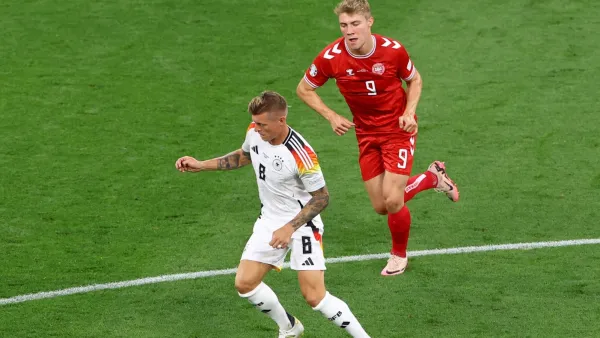Kroos vs Rodri: Germany-Spain Euro Quarterfinal: Despite having the calmest eyes, Rodri is frequently the busiest man on the pitch. He is constantly giving orders, telling his men to maintain discipline and order, telling them to remain composed and weather the storm, noticing potentially hazardous movements, occupying the space left by those assigned to attack, or identifying an unexplored avenue for an attack. However, his eyes stay silent, calmly surveying the pitch, taking in each subsequent move, understanding the major idea of the story and acting upon it before the opposition does.
According to his manager Pep Guardiola, he is the world’s best midfield player. “He is capable of doing anything. The master tactician went into detail about his tempo, his demeanour in difficult situations, his ability to move ahead and backward, and his ability to play both short and long. He also scores significant goals, frequently long-range blasters that win games in stoppage time or equalise them. He also wins the Champions League final. Most importantly, though, is that he transfers control to midfield—the area where huge games are frequently won or lost.
His play against Georgia, where Spain was behind and appeared to be panicking in the opening quarter of the game, showcased the qualities that made him the centre of Guardiola’s career. More than any other player on the pitch, he touched the ball 129 times during the match. He also made three vital tackles, threaded 117 passes with a 93 percent accuracy rate, won all six duels and scored the game’s only goal. Coach Luis de la Fuente said, “A complete performance, but I was more impressed with his calmness as a leader, how he weathered the storm and helped gather our team.” With a 93% accuracy percentage, he made the most passes and touches of any player in the most recent Premier League season. City has only lost two of their last 89 games when he is gliding in the middle of the midfield.
Locking Rodri is therefore the key to unlocking an undefeated Spain, something that few teams, clubs, or nations have been able to do in the last two years. In the quarterfinals, Germany would be conscious of the danger and take encouragement from their own midfield leader, Toni Kroos.
From a vantage point, they differ. While Kroos was a playmaker who was rewired to a conventional box-to-box operator, Rodri is a hybrid holding midfielder who was formerly a defender and is now a defensive midfielder. Both players are not technically position-bound. When Rodri ventures forth with the ball, Kroos occasionally descends further.
But the mission remains the same. must control the middle and allow others around them to shine. The younger players would turn up the adrenaline, with players like Mandel Musiala and Lamine Yamal tearing past opponents and Florian Wirtz and Nico Williams putting on the brakes. These players would fill highlight reels and take centre stage, but Rodri and Kroos’ steadiness and vision allowed the more visually striking players to shine. Because of the unseen work of their midfield enforcers, they could raid on the wings without worrying about losing the ball and inviting a swift counterattack.
Even though Rodri seemed unstoppable, you could feel the danger approaching. Not with Kroos, though. Although he has the muscular physique, striking features, and well-groomed hair of a typical German soldier, he blends into the background on the pitch and may suddenly burst into action, setting up the perfect pass to the right player in the ideal place. He interrupts play without being desperate, is creative without being bold, and positions himself cleanly. He is so precise with his movement, timing, and shape-shifting that he turns midfield control into a sort of physical art form. He wastes no touch or ball.
Respect is reciprocated. Speaking passionately about Rodri, Kroos would say, “He’s one of the most decisive players for Spain and City.” He never gets anxious, maintains his composure, and has scored important goals over the past two years. He is a very good player. In return, Rodri says, “He’s not my type, but he drives his team’s tempo, changes the game, and everything passes through his feet.” Change these lines, and it still makes sense. He was able to score long-range shots and cut the pattern just like Rodri.
Kroos, like the Spaniard, has controlled Germany’s attitude. Germany is an exciting force to behold when he engages in his creative flow. With their deft use of pace and technique, the wingers spread the canvas wide while the nimble strikers strode upfield and rotated their positions. Germany would have rare off days much like him. In this European match, Kroos has created the second-most opportunities in the competition, completed 95.75 percent of the passes with success (416 out of 435). “The closest thing football has to Roger Federer,” as former Argentina midfielder Juan Roman Riquelme put it, is this guy. He doesn’t sweat, gets dirty, or need to collapse, so he may go outside, play, and return home without even needing to take a shower.
However, Kroos and Rodri’s contributions are frequently incalculable. There is no statistic that can quantify mastery of space or setting the game’s pace. They have played the game in spite of having no goals, assists, or tackles to their credit.
They don’t often raise people’s heart rates, draw large crowds to the stadium, or be nominated for Ballon d’Or or player of the season. However, they make the others work, they win matches, and they allow others to flutter about them. Kroos has already said that this will be his final competition; he has given up playing club football. When a reporter asked him the other day if the quarterfinal matchup with Spain would be his last, he was in a very sporty mood. He smiled and remarked, “I don’t think this will be my last match and I assume we’ll all be seeing each other again.”
But after a fierce and entertaining battle for supremacy in the midfield on Friday night, only one of Kroos and Rodri would walk away victorious.

































